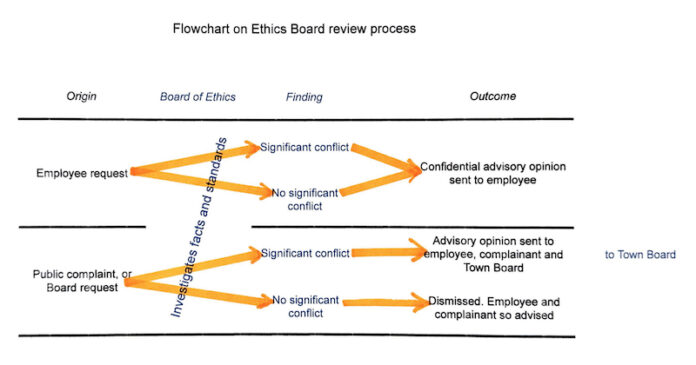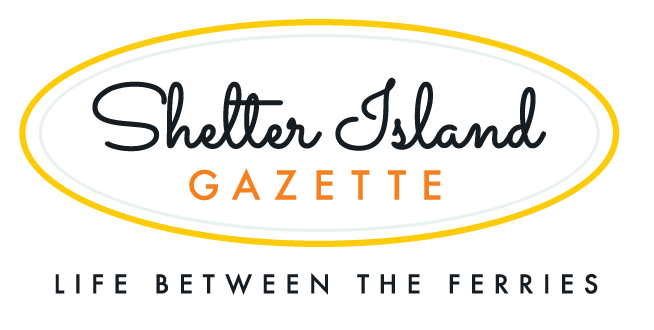
“Lacking” is how Duff Wilson described the Town’s old Ethics Code when he met with the Town Board to preview a critical update.
And that’s not a knock on the circa 1970s code or the volunteers who’ve administered it over many decades. Instead, it’s an acknowledgment that in a rapidly-changing world, it behooves the Town to provide clear guidance for ethical behavior.
Wilson is chairman of the recently revived Ethics Board and has worked with the four other members to craft a replacement for this pivotal Town Code chapter that applies to everyone working for the Town, whether elected, appointed, paid, or volunteer.
Serving with him are Laura Cunningham, Deborah Grayson, Shelby Mundy, and Robert Raiber. Staff support from the Town includes Kristina Martin Majdisova as committee clerk and Town Attorney Stephen F. Kiely as legal advisor.
A peek behind closed doors
You can’t glean much from attending Ethics Board meetings or reading minutes. That’s because all substantive discussions occur behind closed doors in the confidential setting of an executive session. The board’s decisions are also confidential.
So Tuesday’s Town Board work session gave the entire community a rare peek at Ethics Board’s inner workings, a chance to hear from Wilson and his colleagues about their process and the ethical standards they’ve infused in the draft code.
In New York State (and, one would hope, elsewhere), officers and employees who work at any level of government are meant to serve and help the public. Therefore, they shouldn’t use their positions to benefit themselves.
To ensure everyone understands how to behave ethically, governmental entities need clear rules, which will also help protect honest public servants from false accusations. The draft Ethics Code sets out those rules for the Town of Shelter Island.
Model code, with some tweaks
Wilson said the Ethics Board worked from a model code created by the Office of the New York State Comptroller for local governments. The model includes all the state requirements under NYS General Municipal Law, Article 18, and its numerous applicable provisions.
While a town’s Ethics Code has to meet NYS minimums, tweaks are permitted to reflect local values so long as they don’t inhibit baseline standards. So, to ensure the draft captured local nuances, the Ethics Board checked the model against other Town Code chapters, the Town’s employee handbooks, and other relevant resources.
The result is a draft that guides in 15 areas:
- Prohibition on the use of Town position for personal or private gain
- Disclosure of interest in legislation and other matters
- Recusal and abstention
- Exemptions to the above
- Investments in conflict with official duties
- Private employment in conflict with official duties
- Future employment
- Personal representation and claims permitted
- Use of municipal resources
- Interests in contracts
- Nepotism
- Political solicitation
- Confidential information
- Gifts
- Disclosure in certain applications
Investigate complaints, too
The draft also spells out the duties of the Ethics Board, including proposed broadened power to investigate complaints, too. Under the old code, the board can only provide confidential advice to Town officers and employees who specifically request it.
Under the proposed new authority, “if any person believes in good faith that a Town employee or officer is engaged in activity that violates this Code, they may file a complaint with the Board of Ethics.”
Importantly, the draft code provides the Ethics Board with the tools it needs to investigate complaints. In other words, the proposed new section has teeth.
During investigations, the Ethics Board may “administer oaths or affirmations, compel attendance of witnesses, and require the production of any books or records that it may deem relevant and material. The Ethics Board shall make a reasonable effort to obtain voluntary cooperation prior to exercising or enforcing their right to compel testimony.”
“Further, the Ethics Board shall take steps to ensure that every individual’s right to due process is protected,” the draft code says.
Emphasizing education and prevention
The Ethics Board has also recommended that it be permitted to report publicly, with details redacted, in certain instances.
This is a way to demonstrate that it’s actively working to resolve ethical questions and to educate the community about the standards.
“Our goal is to have a reasonable [Ethics Code] that emphasizes education and prevention, not just punishment,” Wilson said.
Town Board members expressed some concerns relating to the imposition of penalties and other details. They agreed to confer at a future work session and provide feedback to the Ethics Board regarding any edits.
Caution: Dense reading ahead
With nine pages of legalese, the draft chapter makes for dense reading. But the ethics team provided a discussion packet with a spreadsheet showing how various provisions differ and a flowchart illustrating how they relate.
You can download the packet here and use it to follow along when you watch the work session on the Town’s YouTube channel or when it comes up in the cable TV feed on Channel 22.
You might think it goes without saying that Town officers and employees mustn’t use their jobs or authority to benefit themselves, relatives, or private organizations they’re connected to financially. But, as usual, the details are bedeviled.
What’s a qualifying financial connection? Who’s a relative? And when does pursuing a valid municipal goal morph into a quest for undue personal gain?
Unsurprisingly, the answers aren’t simple, especially in small towns like ours where everyone seems to be related to one another or has some degree of financial connection.
Thankfully, among New York’s hundreds of towns and villages and scores of cities, the messy work of parsing out what constitutes ethical behavior has long been underway. So there’s an enormous body of knowledge — policies, regulations, court rulings, and more — for an Ethics Board to draw upon.
But, of necessity, the resulting draft policy is like a clockwork, with each little phrase acting as a gear and doing a job that may not be immediately evident but is essential to the entire functioning.
Thus, the feeling when you’re reading it is that maybe you’re a bit dense. Take heart in knowing that, in this case, the material is very challenging.
So, why now?
The most straightforward answer is the Town’s Ethics Code hasn’t kept pace in our rapidly changing world. Lately, Town officials and employees have faced challenges not explicitly addressed in the old, minimalist policy.
This became clear last March when public accusations swirled that as many as three of the seven Waterways Management Advisory Committee members were too conflicted to participate in decision-making about a controversial dock application.
Amid the finger-pointing, the Town Board reanimated the Ethics Board and expanded it from three to five members. As state law requires, the Ethics Board includes one member who works for the Town (Shelby Mundy is a Town account clerk).
While the new Ethics Board has been limited to operating under the old Ethics Code, the Town Board also assigned it to review the code and draft an update.
What’s next for the Ethics Code update?
A discussion of the proposed code will be on the agenda for a future Town Board work session. After incorporating Town Board’s feedback, the Ethics Board will submit a final draft to be scheduled for a public hearing.
[Note: The Town Board has not yet set a public hearing, as we reported earlier.]
Meantime, everyone has time to review the proposal and its companion materials and prepare any questions or comments for the Town Board.
The Town Board limits public comments during meetings to three minutes per speaker (but, if time permits, will sometimes circle back for a second round after those who want to speak have their initial say).
You can submit written comments in advance to the board by email to townclerk@shelterisland.gov. Or, send them by mail c/o Town Clerk, PO Box 1549, Shelter Island, NY 11964. Or, drop them off at the clerk’s office in Town Hall, 38 North Ferry Road.




